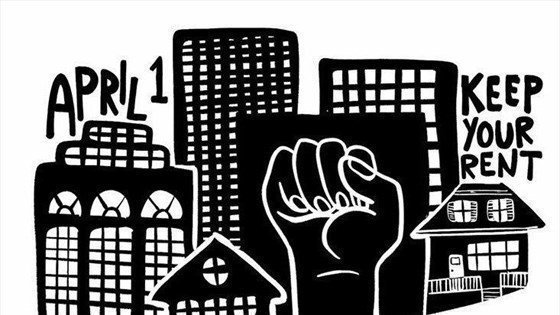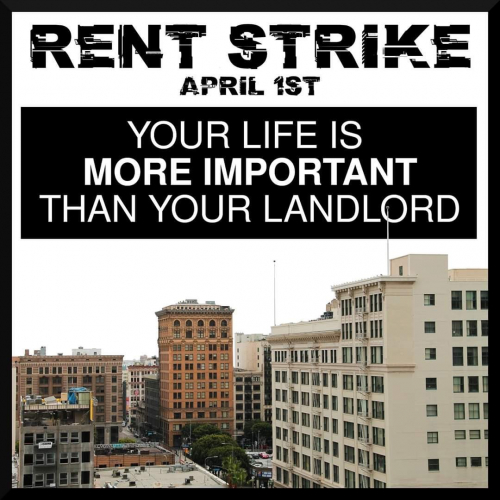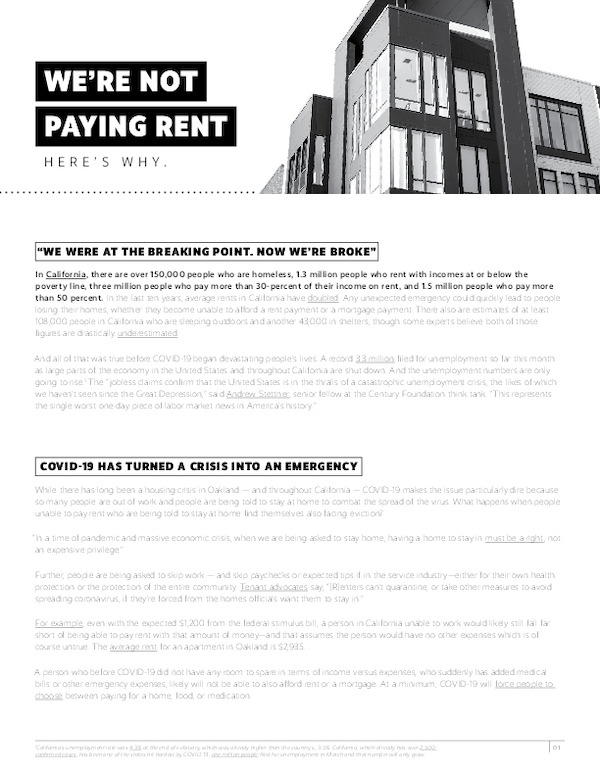We’re Not Paying Rent: Here’s Why

And all of that was true before COVID-19 began devastating people’s lives. A record 3.3 million filed for unemployment so far this month as large parts of the economy in the United States and throughout California are shut down. And the unemployment numbers are only going to rise. The “jobless claims confirm that the United States is in the thralls of a catastrophic unemployment crisis, the likes of which we haven’t seen since the Great Depression,” said Andrew Stettner, senior fellow at the Century Foundation think tank. “This represents the single worst one-day piece of labor market news in America’s history.”
COVID-19 has turned a crisis into an emergency.
While there has long been a housing crisis in Oakland — and throughout California– COVID-19 makes the issue particularly dire because so many people are out of work and people are being told to stay at home to combat the spread of the virus. What happens when people unable to pay rent who are being told to stay at home find themselves also facing eviction?
“In a time of pandemic and massive economic crisis, when we are being asked to stay home, having a home to stay in must be a right, not an expensive privilege.”
Nana Yaa, Rent Strike 2020: A Resource List
Further, people are being asked to skip work—and skip paychecks or expected tips if in the service industry—either for their own health protection or the protection of the entire community. Tenant advocates say, “[R]enters can’t quarantine, or take other measures to avoid spreading coronavirus, if they’re forced from the homes officials want them to stay in.”
For example, even with the expected $1,200 from the federal stimulus bill, a person in California unable to work would likely still fall far short of being able to pay rent with that amount of money—and that assumes the person would have no other expenses which is of course untrue. The average rent for an apartment in Oakland is $2,935.
A person who before COVID-19 did not have any room to spare in terms of income versus expenses, who suddenly has added medical bills or other emergency expenses, likely will not be able to also afford rent or a mortgage. At a minimum, COVID-19 will force people to choose between paying for a home, food, or medication.
The government response isn’t close to enough.
Earlier this month, Governor Newsom put forward an executive order that put the entire responsibility for COVID-19 and housing on cities and counties “authoriz[ing] local governments to halt evictions for renters and homeowners, slow foreclosures, and protect against utility shutoffs for Californians affected by COVID-19.” In response, Leah Simon-Weisberg, legal director with the Alliance of Californians for Community Empowerment, said, “Really disappointing. Total lack of leadership.”
On March 27, the Governor issued a new executive order, ordering a “statewide moratorium on evictions.” This order:
- Stops the Sheriff from physically evicting tenants affected by COVID-19 through May 31, 2020 if they provided certain information to their landlord on or before the day their rent was due and proved this in court;
- Gives tenants 60 days to respond to an eviction lawsuit if they declare in writing within seven days of rent being due that the tenant cannot pay all or part of the rent due to COVID-19
While the order moves a procedural deadline in eviction court cases, it does not legally extend the time for any tenant to pay rent or protect a tenant from being evicted if they do not pay within their normal time frame. Thus, tenants who are unable to pay rent are not any more likely to retain their housing than they were before. They are also still liable for the full amount of rent.
Though the second order is a slight improvement over the governor’s initial order, it still fails to provide almost any protection to thousands of Californians at this time of crisis. It also runs the risk of confusing people as to what happens if they cannot afford to pay rent. Jackie Zaneri, an attorney with the nonprofit Centro Legal de la Raza said the governor’s order is “going to mislead people. People are going to think they are protected when they are not.”
(1) The order is not a moratorium on evictions.
It is only an extension of time for tenants to respond to eviction lawsuits if they knew about the order and complied with the burdensome requirements. It does not extend the time for a tenant to pay or make the tenant more likely to win their case. It places a burden on people to document in writing, and maintain, the reasons why the person could not pay rent, and specifically tie the reasoning to COVID-19. At a time of crisis, there is no justification for adding this burden to people who are already struggling with so many issues. The governor should order a moratorium on all evictions and not require people to also be able to prove the reason in writing– everyone knows that COVID-19 either directly or indirectly played a part in a person’s inability to pay rent. Further, there may be people who cannot pay rent for reasons that began before COVID-19. However, when people are being told to stay home, it is nonsensical that the state would evict that person at this moment.
(2) The duration of the order is insufficient.
The governor should not place a time limit on the order. Instead, it should be a standing order without a specified end or, at minimum, an order that stands until the emergency is over. People should not have to worry about paying rent or a mortgage as long as we remain in a crisis. Ensuring housing for the entire duration of the COVID-19 emergency could decide whether a person survives this crisis or not. The following states have issued moratoriums on evictions either until the end of the crisis or with no specific end date: Indiana, Kentucky, Louisiana, Mayland, Massachusetts, New Hampshire, South Carolina, Tennessee, and Washington, D.C.
(3) The order doesn’t solve the problem. It delays the problem.
A temporary statewide delay on evictions is a sign that Governor Newsom heard the outrage from tenants across the state when he ignored them completely earlier. However, temporarily delaying some eviction cases does not eliminate the problems people are going to face during this crisis. The order specifies that people — many of whom will have lost their jobs — (1) will still have to pay for any missed payments and (2) can still face eviction procedures. In effect, the order does not solve a problem but pushes it down the road. This is why the governor should issue an order suspending all payments, with no penalty or requirement to later cover the missed payments.
A person who cannot pay rent now is unlikely to be able to come up with multiple months rent at a later date. Or knowing that eviction remains a possibility and that April, 2020 rent will still have to be paid for, a person might choose to pay monthly rent but instead forego other necessities such as food and medical bills. The governor should implement measures to ease people’s burdens, not simply shift them around. As Michael McKee, executive director of Tenant PAC, said, “We do not want to come out of this crisis having had extremely low-income people just build up debt that they can’t pay off in the form of back rent.” The solution should be the complete suspension of rent and mortgage payments and forgiveness of the debt. This has currently been proposed in New York, which would allow for a suspension and forgiveness of rent payments for residential and small business commercial tenants, as well as a suspension and forgiveness for mortgage payments.
We do not want to come out of this crisis having had extremely low-income people just build up debt that they can’t pay off in the form of back rent.
Michael McKee, executive director of Tenant PAC
The primary goal must be protecting people first. State and federal governments can help businesses and landlords recover if need be, but government mandates now should not come at the expense of people who will lose their homes or fall deep into debt, both now and when the crisis is over.
Finally, what we want to make clear is that we are not interested in returning to the pre-COVID-19 state of affairs. We must have housing for all who are without homes. Human needs must take priority over corporate greed. The displacement of our community must end. We will stand together today and we will stand together tomorrow until all of us are housed in safety and dignity.
Key Terminology
- Rent suspension: The suspension of the obligation to pay rent, with no later penalty, fee, or requirement to pay the rent for missed month at a later date.
- Eviction moratorium: An order that prevents a person from being forcefully evicted from a home for any reason for a period of time. [Note: Many rental companies and landlords, have eviction protection insurance that covers them in the event a tenant cannot pay rent.]
- Defense for Unlawful Detainer: When an eviction protection comes in the form of a defense that can be raised in defense of an eviction lawsuit.
- Rent freeze: An order that prevents landlords from increasing rent. The aim of a rent freeze is to protect people whose lease may end during an emergency or crisis situation. This is also often referred to as a “rent increase moratorium.”
- Rent strike: A group coming together to all agree not to pay rent. As is stated here, the difference between a strike and individuals on their own deciding not to pay rent at this time is strength in numbers. “Organizing with other people!”
- Right to Housing: Every human being, by virtue of being a human being, deserves to have safe housing. Safe housing should not be a luxury, it is a right. Art. 25 of the Universal Declaration of Human Rights states, “Everyone has the right to a standard of living adequate for their health and well-being and that of their family, including food, clothing, housing and medical care and necessary social services, and the right to security in the event of unemployment, sickness, disability, widowhood, old age or other lack of livelihood in circumstances beyond their control.”
Get Involved
If you'd like to help with maintaining or developing the website, contact us.
Publish
Publish your stories and upcoming events on Indybay.




